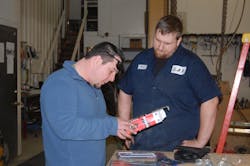The Automotive Trade School Class of 2015 is already starting to hit the workforce.
They likely have big dreams and a small bag of tools. Will they be your dream customers -- or your worst nightmare? It all comes down to how you manage the opportunity. Here are some thoughts on dealing with new technicians.
Q: Isn’t selling to new technicians a big risk?
A: It can be a big risk. But it can be a big reward, too. They may not have a lot of cash, but they don’t likely have a house payment, a family or a lifetime of debt, either. Keep in mind they have a whole career ahead of them. That’s a lot of potential years as your customer.
The major issue is that a young technician isn’t established yet, so they probably don’t have a credit history. That’s a lot different than having a bad credit history. They just need a chance to prove themselves. You can be the one to give them that chance.
That doesn’t mean every new technician will prove to be a good customer. But if you’ve been a dealer for any length of time, you probably already know that’s true of any new customer.
“If it’s a young technician, he’s going to need a basic set of tools, which you’re going to have the opportunity to sell them,” says northeastern Illinois-based Cornwell dealer Ken Jaros. “But it’s also a roll of the dice a lot of times. If you can’t get the young guy approved on credit, you’re going to be holding a significant balance … I’m more of a gambler than a lot of the dealers are … and that’s worked out for me.”
Q: They probably have a ton of student debt, too. Aren’t they already strapped?
A: Some may have a lot of debt, some may not. Everyone is different.
If you’ve been burnt before by a new technician who overbought or skipped, you may feel gun-shy about doing it again. I don’t blame you. But many dealers have found it well worth the time to get to know the prospective new customer and take a measured risk.
“I look at it this way, if I don’t do it, then the other guy is going to do it,” says Joe Gruba, a 10-year veteran Cornwell dealer covering northern Portland, Ore. “So, I make this my opportunity. Have I lost money doing that? Yeah. Have I made money? Yeah, a lot more. And I’ve gained more customers by taking the risk.”
The key to separating the profitable newbie from the headache is asking good questions. Get a feel for who they are and how much you can comfortably extend.
“Talking to other guys in the shop can help,” says Gruba. “Usually, they’ll let you know he’s not doing so well, or he’s going to be a high risk or he’s good, they’re going to keep him around … They’ll let you know before you even ask.”
Then be sure you set your ground rules upfront and firmly.
“I don’t know you, and you don’t know me,” says Richard Benitez, a Cornwell dealer from New Braunfels, Texas, to any new customer when he opens a new truck account. Benitez encourages new customers to ask any technician in the shop what kind of dealer he is. Then he explains that he expects the trust and respect to be returned.
“It’s a personal relationship between you and me,” Benitez tells the newbie.”If you decide you’re not paying, you’re not taking money away from Cornwell. You’re affecting me personally.”
Q: What if I’m still not comfortable putting my money out there?
A: First and foremost: trust your gut. The longer you’ve been a dealer, the stronger instinct you’ll have.
“I can tell right off the bat if the guy’s flaky or if he’s going to be a pretty stand-up guy,” says Jaros.
If you’re still unsure, try running the new customer through your flag’s credit system as a double check.
Often new technicians will be denied credit. When running a credit application through his flag’s system, Benitez says he listens carefully to the response. If the customer has no credit history, he may extend a trial account for a small amount and grow it as the trust builds. But if the customer isn’t paying other dealers or his other bills, he treats the situation differently.
Some new technicians will get approved by your flag’s credit for thousands. That can help the customer get a full set of basic tools and help you avoid carrying a big balance for a long haul.
Q: So, what do I start selling to young technicians?
A: “If you don’t have the tools, you don’t have a job,” says Jaros. “You’re there to work, you’re not there to borrow the other guy’s tools. He’s been paying for those tools for 25 years.”
If you want to know what the new tech needs, just find out from the other guys what he’s borrowing says Gruba. “Kind of rule of thumb for technicians is: if you borrow it twice you must need it -- for sure if you borrow it three times!”
Most students leave school with just a small handful of tools and no idea what they need.
“They don’t know exactly what they need until they get into that independent shop or into that dealership or wherever they’re working, and they start noticing what kind of work is getting fed to them,” says Jaros.
All the dealers I talked to agreed that they point their new technician customers to their monthly sales flyer where they can get good products at good prices.
Q: How do I keep a new technician from getting in over his head?
A: It sounds easy: You just control how much credit you extend to your new customer.
Say you agree to $40 a week terms for 10 weeks. That’s a pretty simple way to keep that customer in check. You’ve set a limit of about $400. But the problem is you can’t control how much credit your competitors will extend to this technician. If that same customer gets $40 terms from several other dealers, it won’t be long before he owes more than he can pay every week, says Benitez.
We’ve all been young and foolish. We know how easy is is to overextend ourselves -- even if we’re old and not so foolish!
Benitez says he tells his new customers to stick with one dealer when they’re starting out. He says he doesn’t care which dealer they choose. (Although he strongly suggests he’s the best choice!) But he makes it clear that he’s looking out for the new customer. He doesn’t want to see him get in trouble. He explains that it’s in everyone’s best interest to do that -- the tech’s and the dealer’s. Most take his advice ... but there are always a few that don’t.
Q: How can I become the “Tool Dealer Of Choice” for new technicians?
A: The key is the same to become the number-one dealer for any customer. Treat the customer with respect, give them honest, personal service and stand behind your product.
“You have to sell yourself before you sell your flag,” says Jaros.
Q: Won’t young technicians buy my cheapest tools? Where is the money in that?
A: Sometimes they will, sometimes they won’t. They may buy your cheapest screwdrivers but they may want deep well sockets that last them a lifetime. Or vice versa. Everyone has different priorities. In the end, for every $1,000 in tools they buy you’ll see about same bottom line if it’s two purchases or 10 purchases.
The best strategy is to give your customers a bunch of choices. Let them decide how they want to spend their money.


